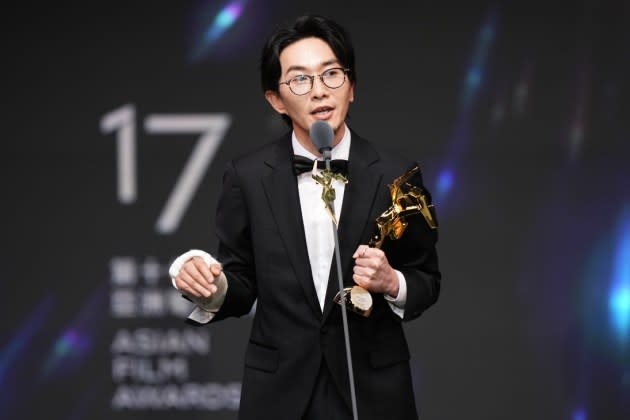Filmart: Nick Cheuk Talks Grief, Creativity and Hong Kong Cinema

Nick Cheuk’s debut feature was a small film about a very big topic.
For Time Still Turns the Page, the Hong Kong director trained his focus on the issue of youth suicide, one that directly affected the filmmaker 14 years ago, when a friend at university died by suicide.
More from The Hollywood Reporter
It’s a film that comes fraught with emotion, as it follows the story of a school teacher forced to face a tragedy from his past, and it has brought much acclaim for Cheuk, including the best new director award at the 60th Golden Horse Awards in Taiwan last year and a win in the same category at this year’s Asian Film Awards (AFAs), held Sunday in Hong Kong.
What seems more surprising to the 35-year-old director, when he sits down to talk with The Hollywood Reporter on the eve of the AFAs, is that the film found an audience — and box office to the tune of HK$25 million ($3.2 million), enough for the film to rank as the second highest-grossing film in Hong Kong in 2023.
“I thought this would be the only film I would ever make, given the topic,” he says. But Cheuk’s stylish touch has meant the suitors — and the studios — have come calling, and while he won’t share the exact details just yet, he says an announcement about his next project will come in the days ahead this week at Filmart, Hong Kong’s annual international content market.
Time Still Turns the Page is the latest in a stream of small, acclaimed and distinctively Hong Kong productions Cheuk believes have emerged as production numbers and funds have dried up.
“Young filmmakers don’t get big budgets, so our films are more personal,” says Cheuk, as he talks to THR about his film’s great success, his inspirations and his hopes for a future in film.
Can we talk about your film’s success and its very personal nature? How has this experience played out for you?
It’s already difficult to initiate a movie in Hong Kong, and so I went in thinking this might be my only film because of its topic. But I had to make this film. During my university years, a friend of mine [died by suicide]. I’d met him on the night he died and after that, I had so many questions. That was 14 years ago and for all these years, I have always thought about a lot of these questions. It is the one thing in my life that has concerned me the most, and so it felt like it was what I had to make my first film about. I had mixed feelings about the whole process. I knew that for the audience there would be different feelings, and for some it might bring out the sadness in their hearts. I didn’t really wish that to happen but I knew it would.
How has the audience reaction in Hong Kong been overall, given the nature of this story, and how have they responded in the Q&As you have been involved in?
Talking to the audience in person and on social media, a lot of them told me they hadn’t been able to talk about their own experiences for years. But now they could. I think a lot of people think they are the only one carrying these feelings but they’re not and these feelings can be shared.
Did the film’s success catch you by surprise?
Yes. Me and my team, we’re all very surprised. In the beginning, the hope was to make enough from the box office to be able to keep making films. That’s all. But studios have been calling me and we have been discussing what I can do next.
Can you share the memories of the first films that made an impact on you, and what films maybe inspired your own first production?
I saw Disney’s The Hunchback of Notre Dame when I was about eight or nine years old and that was the first time I felt the power of cinema. That first scene, when you see Notre Dame among the clouds, and then you’re taken down from the clouds and into the street — that was very memorable. But Good Will Hunting really spoke to me, when I was about 14. Even though for me, this was a foreign film, I really felt like it was talking to me. That was also really powerful, and I think it showed me how cinema can do that — talk to you.
How are the opportunities today for emerging filmmakers in Hong Kong?
The lack of money is actually a very good opportunity to express themselves and share what they feel. But also at the same time, they feel like the lack of experience they have means there’s a fear of trying something with really big budgets. One of the big differences between us and directors from the older generation is we actually haven’t had the chance to work with big budgets immediately, like a lot of them did. It really helped them learn their craft, and be surrounded by people with so much experience. We actually need to learn and experience that too but we lack the chance.
What can you tell us about your next production?
It’s not going to be like Time Still Turns the Page. That would be too much of a mental burden. I feel like my heart needs a little rest. I want to try all different types of film, including comedy, romance, even action and thrillers. I want to explore everything. I have an announcement to make during Filmart but that’s all I will say.
Best of The Hollywood Reporter

 Yahoo News
Yahoo News 